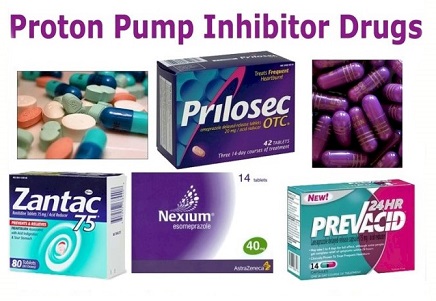Usage Of Proton Pump Inhibitors Associated With Higher Risk Of Susceptibility To Influenza, Pneumonia And COVID-19
Nikhil Prasad Fact checked by:Thailand Medical News Team Apr 27, 2024 1 year, 7 months, 3 weeks, 4 days, 19 hours, 19 minutes ago
Medical News: The adverse effects of proton pump inhibitors (PPIs) have raised significant concerns, with particular attention to their potential impact on respiratory infections. This study from Southern Medical University, Shantou University Medical College, and other esteemed institutions aimed to evaluate the association between PPI use and the risks of influenza, pneumonia, and COVID-19.
 Usage Of Proton Pump Inhibitors Associated With Higher Risk
Usage Of Proton Pump Inhibitors Associated With Higher Risk
Susceptibility To Influenza, Pneumonia And COVID-19
Proton pump inhibitors (PPIs) are widely prescribed for various gastric conditions, but their long-term and inappropriate use has been linked to several adverse health outcomes. Concerns have been raised in various
Medical News coverages about their potential role in increasing susceptibility to respiratory infections such as influenza, pneumonia, and more recently, COVID-19. (see below) While some studies suggest a link between PPI use and respiratory infections, others present conflicting evidence, necessitating further investigation.
Literature Review
Prior cohort studies in different countries have shown mixed results regarding the association between PPI use and respiratory infections. Some studies reported increased risks of pneumonia associated with PPI use, while others found no significant association. Similarly, studies examining the relationship between PPI use and COVID-19 susceptibility have yielded conflicting results, with some indicating a potential risk and others finding no significant association. The literature also lacks exploration into the association between PPI use and influenza, highlighting a critical gap in knowledge.
Methodology
This study utilized data from the UK Biobank, including 160,923 participants aged 38 to 71 years, to investigate the association between regular PPI use and the risks of influenza, pneumonia, and COVID-19. Cox proportional hazards regression and propensity score-matching analyses were employed to estimate hazard ratios (HRs) and 95% confidence intervals (CIs). Additionally, comparisons were made with histamine-2 receptor antagonist (H2RA) users to mitigate confounding by indication.
Results
The study found that regular PPI use was associated with increased risks of developing influenza (HR 1.32, 95% CI 1.12-1.56) and pneumonia (HR 1.42, 95% CI 1.26-1.59). However, the risk of COVID-19 infection was not significantly associated with PPI use (HR 1.08, 95% CI 0.99-1.17), although the risks of severe COVID-19 (HR 1.19, 95% CI 1.11-1.27) and mortality (HR 1.37, 95% CI 1.29-1.46) were increased. Notably, when compared to H2RA users, PPI users had a higher risk of influenza (HR 1.74, 95% CI 1.19-2.54) but not pneumonia or COVID-19-related outcomes.
Key Findings
The study uncovered several significant associations:
-Regular PPI users exhibited increased risks of developing influenza (HR 1.32) and pneumonia (HR 1.42).
;
-COVID-19 infection risk was not significantly associated with PPI use, but severity (HR 1.19) and mortality (HR 1.37) were elevated.
-When compared directly with H2RA users, PPI users had a higher risk of influenza but not pneumonia or COVID-19-related outcomes.
Discussion
The findings of this study contribute significantly to understanding the association between PPI use and respiratory infections. While regular PPI use was linked to an increased risk of influenza and pneumonia, the association with COVID-19 infection was less pronounced, especially when compared to H2RA users. The study also highlights the importance of considering patient characteristics and genetic factors (CYP2C19 metabolizers) in assessing the risks associated with PPI use.
Implications
The findings underscore the need for cautious PPI use, especially concerning respiratory infections. While the study reinforces previous evidence linking PPIs to influenza and pneumonia, it also sheds light on the nuanced relationship with COVID-19. Notably, comparisons with H2RA users revealed divergent outcomes, hinting at the importance of considering alternative medications based on individual patient profiles.
Limitations and Future Directions
Despite its robust methodology, the study faced limitations such as the lack of data on specific PPI types, dose-duration relationships, and certain confounding factors like Helicobacter pylori eradication indications. Future research should aim to address these gaps and explore the impact of PPIs across diverse population groups to garner more comprehensive insights.
Conclusion
In conclusion, the study's extensive analysis confirms the heightened risks of influenza, pneumonia, and COVID-19 severity/mortality among regular PPI users. However, comparisons with H2RA users reveal a nuanced picture, prompting a reassessment of PPI prescriptions in clinical practice. Moving forward, tailored approaches to PPI usage and further investigations into their effects on respiratory health are imperative for informed decision-making and patient well-being.
The study findings were published in the peer reviewed journal: eLife.
https://elifesciences.org/reviewed-preprints/94973
For the latest
Medical News, keep on logging to Thailand Medical News.
https://www.thailandmedical.news/news/u-s-study-shows-that-users-of-proton-pump-inhibitors-or-ppis-have-higher-mortality-risk-when-infected-with-covid-19
https://www.thailandmedical.news/news/covid-19-warning-malaysian-led-research-shows-that-gastric-reflux-drugs-ppis-linked-to-increased-risk-of-severe-or-fatal-covid-19-outcome
https://www.thailandmedical.news/news/breaking-news-covid-19-alert-research-led-by-cedars-sinai-indicates-that-proton-pump-inhibitors-ppis-use-is-linked-to-increased-risk-of-covid-19
